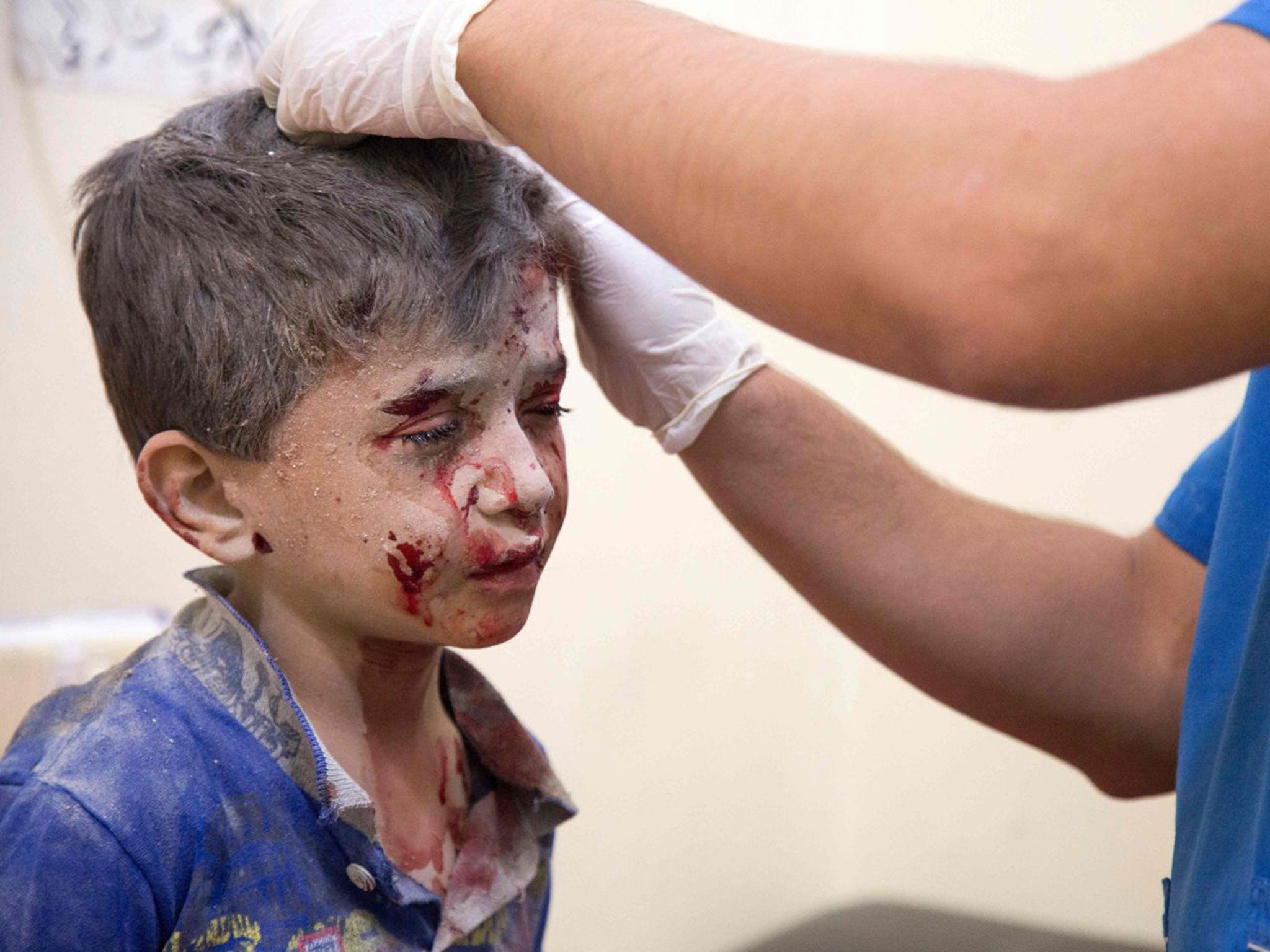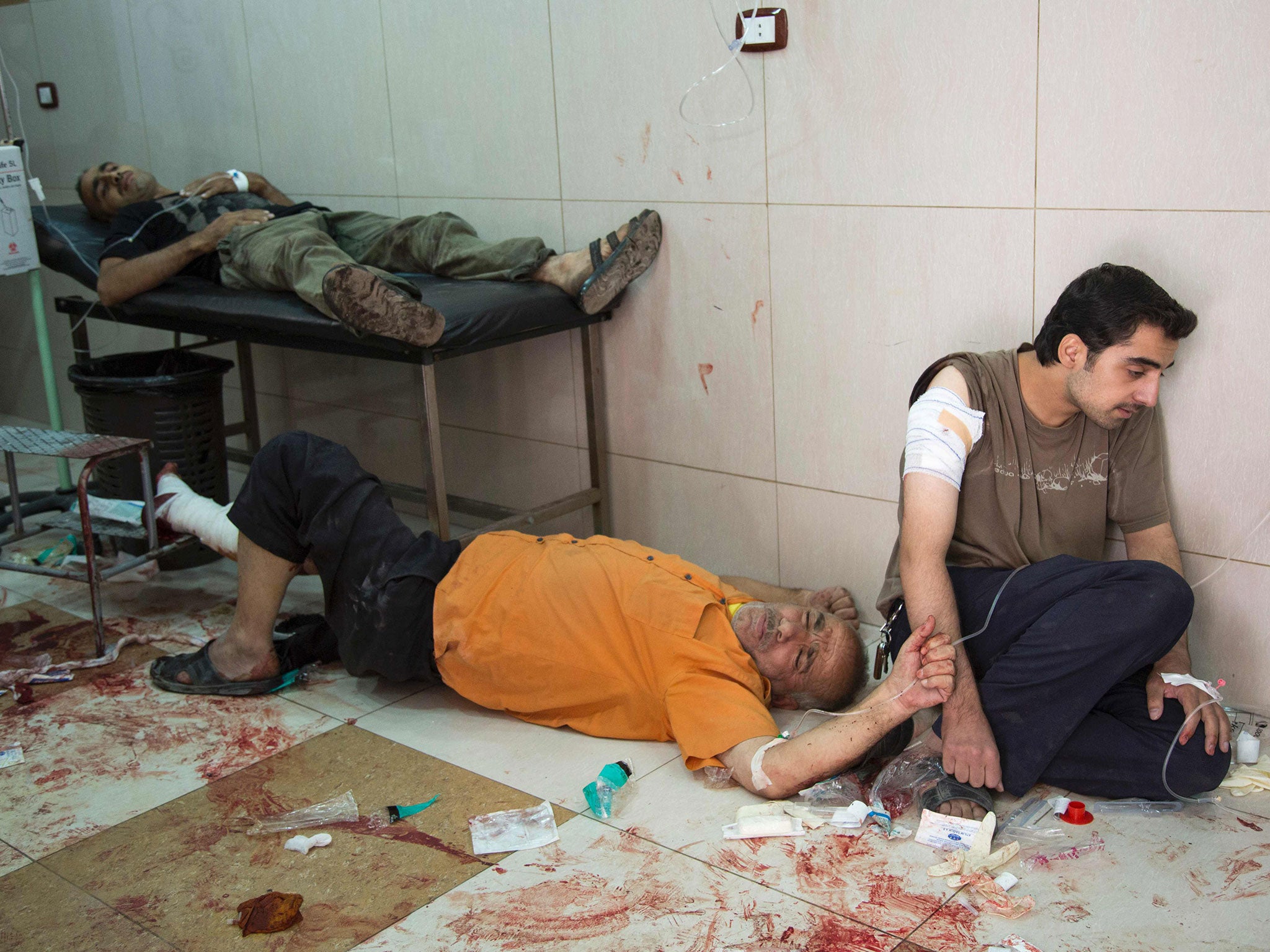Syrian war: Dozens of civilians killed as almost 2 million left without water by ‘relentless’ air strikes in Aleppo
Rescue workers say hospitals ‘overwhelmed’ with injured patients as bodies dug out from rubble
Your support helps us to tell the story
From reproductive rights to climate change to Big Tech, The Independent is on the ground when the story is developing. Whether it's investigating the financials of Elon Musk's pro-Trump PAC or producing our latest documentary, 'The A Word', which shines a light on the American women fighting for reproductive rights, we know how important it is to parse out the facts from the messaging.
At such a critical moment in US history, we need reporters on the ground. Your donation allows us to keep sending journalists to speak to both sides of the story.
The Independent is trusted by Americans across the entire political spectrum. And unlike many other quality news outlets, we choose not to lock Americans out of our reporting and analysis with paywalls. We believe quality journalism should be available to everyone, paid for by those who can afford it.
Your support makes all the difference.Dozens of civilians have been killed in a third day of relentless bombing in Aleppo as the regime’s brutal advance on rebel-held areas of the Syrian city continues.
At least 25 men, women and children were reported dead by Saturday morning, buried under the rubble of their destroyed homes as hospitals were overwhelmed with the wounded.
By the afternoon, estimates by the Local Coordination Committees put the death toll at 49, and the figure was expected to rise as rescue workers dug bodies out of ruined buildings.
The roar of a retreating warplane, believed to be Russian, could be heard as one devastating strike hit, with footage showing a huge explosion resonate across the city before sending a huge plume of dust and smoke hundreds of feet into the air.
Residents cautiously emerged into the streets amid a pause in the assault, trying to clear rubble from a devastated street and salvage their belongings.
Meanwhile, the United Nations voiced concern over a mounting humanitarian crisis after a strike on a pumping station left residents without running water.
The Syrian Civil Defence group, known as the White Helmets, reported horrific conditions in opposition-controlled eastern Aleppo as the attacks continued.
“Non-stop air strikes in Aleppo. Teams are under tremendous pressure. Horrific indiscriminate bombardment,” said a message on Twitter.
“All Aleppo teams and volunteers active across the city – hundreds trapped under rubble from indiscriminate air strikes. Hospitals overwhelmed.”
At least five rescue volunteers had been injured, a day after four of the Nobel prize-nominated group’s centres were damaged by bombing.
Rebel officials said Saturday’s strikes hit at least four districts in besieged eastern Aleppo, which is home to more than 250,000 people, saying Russian planes were believed to be mainly responsible.

The attack drew on ordnance more destructive than anything previously in the area, destroying entire buildings and leaving huge craters in the ground.
“There are planes in the sky now,” Ammar al-Selmo, the Aleppo director of the White Helmets, told Reuters. ”Our teams are responding but are not enough to cover this amount of catastrophe.”
A Syrian military source said the strikes were part of an operation announced on Thursday that could include a ground invasion, with the advance so far “continuing according to plan”.
Monitors at the UK-based Syrian Observatory of Human Rights said President Bashar al-Assad’s supporters drove rebels out of the Handarat Camp district “as a result of intensive bombardment by regime forces and the fierce, continuous bombardment by Russian and regime warplanes”.
Liwa al-Quds, a pro-regime Palestinian militia, spearheaded the advance in the former refugee camp supported by Syrian Army artillery.
The former al-Qaeda affiliate Jabhat Fateh al-Sham, previously known as Jabhat al-Nusra, is leading an Islamist offensive outside the divided city but factions inside besieged areas are regarded as moderate opposition.

Asked what weapons were being used, the official told Reuters the military was using weapons “suitable for the nature of the targets being struck, according to the type of fortifications”, such as tunnels and bunkers, and “specifically command centres”.
President Assad and his forces have persistently denied targeting civilians and said operations are hitting only “terrorist” opposition groups.
But scenes on the ground told a different story. Images that are too graphic to publish showed rescue volunteers pulling the bodies of small children out of the rubble of their family homes, with a woman cradling her baby killed while sitting next to her young son on their sofa.
In overwhelmed clinics, children were seen crying and covered in blood, with some having to undergo surgery for horrific injuries.
The death toll is believed to have passed 100 since Friday but figures were impossible to verify as recovery work continues.
Infrastructure in eastern Aleppo is also suffering critical damage, with medical clinics, roads and a vital water station in Bab al-Nairab hit.
The United Nations said almost 2 million people have been left without running water by an air strike and rebels’ decision to switch off the Suleiman al-Halabi pumping station in revenge.
Hanaa Singer, a Unicef representative in Syria, said residents in eastern Aleppo will have to resort to contaminated wells, while those in the government-controlled west have access to safe groundwater.
“Depriving children of water puts them at risk of catastrophic outbreaks of water-borne diseases,” she added.
“It is critical for children’s survival that all parties to the conflict stop attacks on water infrastructure, provide access to assess and repair damage to Bab al-Nairab station, and switch the water back on at the Suleiman al-Halabi station.”
Gareth Bayley, the UK special representative for Syria, was among those voicing his consternation amid anger over the intensity of the violence in the wake of a week-long ceasefire.
“East Aleppo bombardment destroying hospitals, water pumping station, civil defence teams,” he wrote on Twitter. “International humanitarian law anyone?”
Doctors Without Borders (MSF) said its hospitals were reporting significant increases in the number of patients injured in the “relentless” bombing.
“People in Aleppo already suffocating under the effects of the siege, have yet again come under horrific attack,” said Carlos Francisco, MSF head of mission in Syria.
“No aid, including urgent medical supplies is allowed to enter. We are deeply worried by the high numbers of wounded reported by the hospitals we support, and also know that in many areas the wounded and sick have nowhere to go at all – they are simply left to die.”
Join our commenting forum
Join thought-provoking conversations, follow other Independent readers and see their replies
Comments